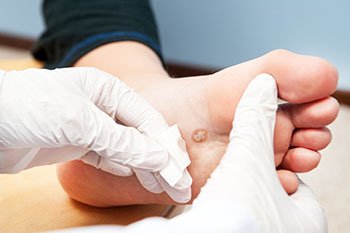

Plantar warts are essentially growths on the feet and they can develop when an individual contracts the human papillomavirus, also known as HPV. These warts can feel hard on the feet and in some cases, they might cause pain. Plantar warts can develop when an individual has skin contact with HPV. Importantly, HPV may be transmitted to someone when they fail to wear shoes in a public area, such as locker rooms and public pool areas. It is also common for someone to contract HPV from infected household members. If you have plantar warts, it might be advisable to take precautions to limit the extent to which you are spreading the human papillomavirus to others. This might include wearing shoes around the house if you live with others. Contact a podiatrist today if you think that you have plantar warts and want to treat this condition.
Plantar warts can be very uncomfortable. If you need your feet checked, contact one of our podiatrists from Grand Blanc Family Footcare. Our doctors will assist you with all of your foot and ankle needs.
About Plantar Warts
Plantar warts are the result of HPV, or human papillomavirus, getting into open wounds on the feet. They are mostly found on the heels or balls of the feet.
While plantar warts are generally harmless, those experiencing excessive pain or those suffering from diabetes or a compromised immune system require immediate medical care. Plantar warts are easily diagnosed, usually through scraping off a bit of rough skin or by getting a biopsy.
Symptoms
Treatment
To help prevent developing plantar warts, avoid walking barefoot over abrasive surfaces that can cause cuts or wounds for HPV to get into. Avoiding direct contact with other warts, as well as not picking or rubbing existing warts, can help prevent the further spread of plantar warts. However, if you think you have developed plantar warts, speak to your podiatrist. He or she can diagnose the warts on your feet and recommend the appropriate treatment options.
If you have any questions please feel free to contact our office located in Grand Blanc, MI . We offer the newest diagnostic and treatment technologies for all your foot and ankle needs.